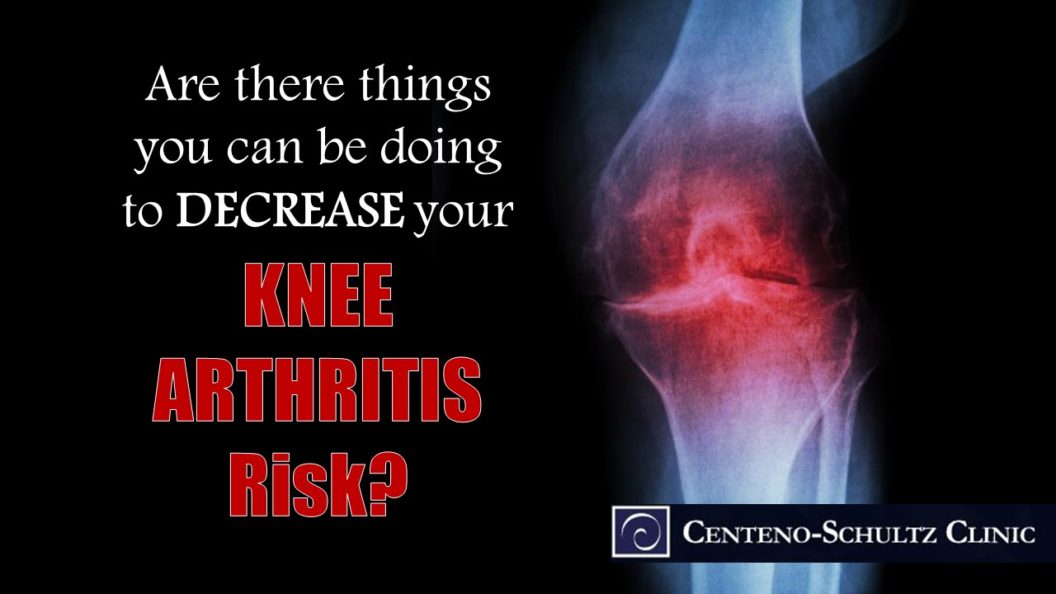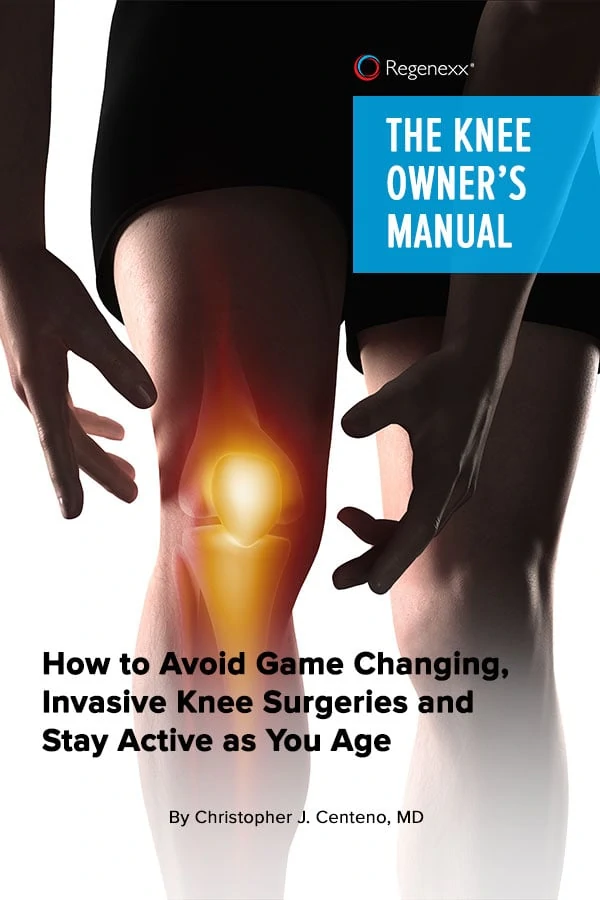Arthritis comes in many forms, such as osteoarthritis, rheumatoid arthritis, and traumatic arthritis (arthritis that occurs due to an injury), but the most common, by far, is osteoarthritis (OA) with over 30 million Americans, according to the CDC, carrying an OA diagnosis. The most common joint for arthritis to develop in is the knee, and, likewise, the most common arthritis that occurs in the knee is OA. In fact, we’ve seen our risk for knee arthritis more than double since the mid-20th century.
So as we continue spotlighting arthritis throughout May for National Arthritis Month, today we are going to examine what you can do to decrease your risk for knee arthritis. First, let’s define knee arthritis.
What Is Knee Arthritis?
Arthritis in its basic form is defined as inflammation (-itis) of the joint (arthro-). Osteoarthritis is inflammation of the bone (osteo-) and joint. When we talk about knee arthritis, unless otherwise stated, it is OA that we are talking about. Knee OA is a chronic disease that results as cartilage, the “cushion” between the bones in the knee joint that absorbs shock, begins to wear down. Symptoms include chronic knee pain and swelling (though pain may be related to nerves, not the worn cartilage) as well as stiffness, and knee function can be drastically impacted as the disease progresses. Bone-on-bone arthritis can eventually result in the most severe cases.
While most people believe arthritis is a disease that develops in older age, it seems that over 50% of patients with knee arthritis are actually younger than age 65. So, by far, the best way to address knee arthritis is to decrease your risk for developing it in the first place, and we have a few suggestions to guide you in this endeavor.
Ways You Can Decrease Your Risk for Knee Arthritis
Let’s start with knee arthritis risks we can’t change; aging and genetics. While aging can certainly be a factor, with knee arthritis being so prevalent today and with so many younger patients being diagnosed, we can’t blame it all on aging. Genetics, of course, also plays a part, but keep in mind that we have double the risk for severe knee arthritis today when compared to our mid-20th-century ancestors (16% today; 6% then). So why is there so much more knee arthritis today?
Since the mid-1900s, we’ve seen drastic lifestyle changes and a medical and pharmaceutical industry “advancing” at breakneck speed. However, in the past few decades, the scientific research has finally started catching up, and it’s revealing many potential reasons for the sharp climb in knee arthritis diagnoses. Let’s take a look at a few things you can do to decrease your risk for knee arthritis.
Keep Your Blood Pressure Under Control
High blood pressure is known as hypertension, and it occurs when too much pressure is placed on the walls of the arteries as blood is pumped through the body. One study found that hypertension increases the risk for knee arthritis. Factors that contribute to hypertension include obesity, lack of exercise, smoking, and so on. Genetics may play a part here as well, but keeping the things you can control in check will help you keep hypertension under control.
Keep Metabolic Syndrome at Bay
High blood pressure combined with other factors, such as obesity, high blood sugar and diabetes, and poor diet and lack of exercise, define metabolic syndrome. Metabolic syndrome truly is an epidemic in America today. Metabolic syndrome has also been linked to arthritis and the breaking down of cartilage. So how do you keep metabolic syndrome at bay? Start with a healthy diet and exercise, and much of the rest will fall into place.
Don’t Fall Prey to the Low-Fat, High-Carb Diet
The low-fat movement has been discredited in recent years as its been found the science involved was highly flawed, and potentially even fraudulent. We now know low fat, high-carb diets encourage metabolic syndrome (which as mentioned is linked to knee arthritis) and many other diseases. Download Nutrition 2.0 by Dr. Pitts for free to help you get started on a healthy diet for life.
Don’t Become a Couch Potato
There are many forms of exercise that can not only keep your joints healthy but also provide benefits if you already have knee arthritis. Ideally, keeping your knees strong as you age will keep your knee arthritis risks lower. However, if you already have knee arthritis, this doesn’t mean you have to live a sedentary lifestyle.
Want to Get Back to What You Love, Without Surgery and Medication?
Don’t Take NSAIDs
Nonsteroidal anti-inflammatory drugs (NSAIDs), whether they are over-the-counter or prescription, are dangerous drugs; it says so right on the labels because the FDA requires it. Despite this, Americans pop them for everything from the most minor headaches and inflammation to more severe arthritis pain and swelling. In fact, some, such as some long-distance runners and other athletes, even take them to prevent pain and swelling. Unfortunately, NSAIDs progress arthritis, according to research.
Don’t Get Steroid Injections
High-dose steroids have been shown to, among many other things, be toxic to cartilage, and clearly the last thing we want to do is speed up the onset of knee arthritis by chemically breaking down the cartilage.
Don’t Get Meniscus Surgery
Meniscus surgery is a risk factor for the development of arthritis as the surgery, over 95% of the time, involves removing pieces of the meniscus that is meant to protect the cartilage. In time, this unprotected cartilage breaks down, causing knee arthritis.
Instead of NSAIDs, steroids, and surgery, there are orthobiologic options to treating and preventing arthritis. Even if you are genetically inclined to developing knee arthritis, don’t speed up its potential onset or give it a foothold by participating in lifestyle choices and medical “advances” that will increase your risk for knee arthritis. Focus on the things you can do to decrease your risk for knee arthritis.
Check back in with us next Tuesday, May 8, when we continue our National Arthritis Month series with a post on hip arthritis.

